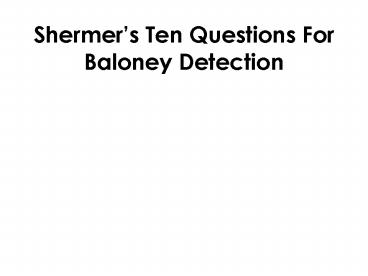Shermers Ten Questions For Baloney Detection - PowerPoint PPT Presentation
1 / 11
Title:
Shermers Ten Questions For Baloney Detection
Description:
... habit of going well beyond the facts, so when one individual makes numerous such ... How does this fit with what we know about the world and how it works? ... – PowerPoint PPT presentation
Number of Views:62
Avg rating:3.0/5.0
Title: Shermers Ten Questions For Baloney Detection
1
Shermers Ten Questions For Baloney Detection
2
Question 1
- How reliable is the source of the claim?
3
Question 2
- Does this source often make similar claims?
- Pseudoscientists have a habit of going well
beyond the facts, so when one individual makes
numerous such claims it is a sign that they are
more than just iconoclasts.
4
Question 3
- Have the claims been verified by another source?
- Typically, nonscientists and pseudoscientists
will make statements that are unverified, or
verified by a source within their own belief
circle. We must ask who is checking the claims,
and even who is checking the checkers.
5
Question 4
- How does this fit with what we know about the
world and how it works? - An extraordinary claim must be placed into a
larger context to see how and where it fits.
6
Question 5
- Has anyone gone out of their way to disprove the
claim, or has only confirmatory evidence been
sought? - This is the confirmation bias, or the tendency to
seek confirmatory evidence and reject or ignore
disconfirmatory evidence.
7
Question 6
- Does the preponderance of evidence converge to
the claimants conclusion, or a different one? - The theory of evolution, for example, is proven
through a convergence of evidence from a number
of independent lines of inquiry.
8
Question 7
- Is the claimant employing the accepted rules of
reason and tools of research, or have these been
abandoned in favor of others that lead to the
desired conclusion?
9
Question 8
- Has the claimant provided a different explanation
for the observed phenomena, or is it strictly a
process of denying the existing explanation? - This is a classic debate strategy-criticize your
opponent and never affirm what you believe in
order to avoid criticism. But this strategy is
unacceptable in science. Proponents of the
pyramids as being built by pre-Egyptians offer no
evidence of just who these people are, and
instead just pick at anomalies in the work of
Egyptian archaeologists.
10
Question 9
- If the claimant has proffered a new explanation,
does it account for as many phenomena as the old
explanation?
11
Question 10
- Do the claimants personal beliefs and biases
drive the conclusions, or vice versa? - All scientists hold social, political, and
ideological beliefs that could potentially slant
their interpretations of the data. The question
is how do those biases and beliefs affect the
research?































